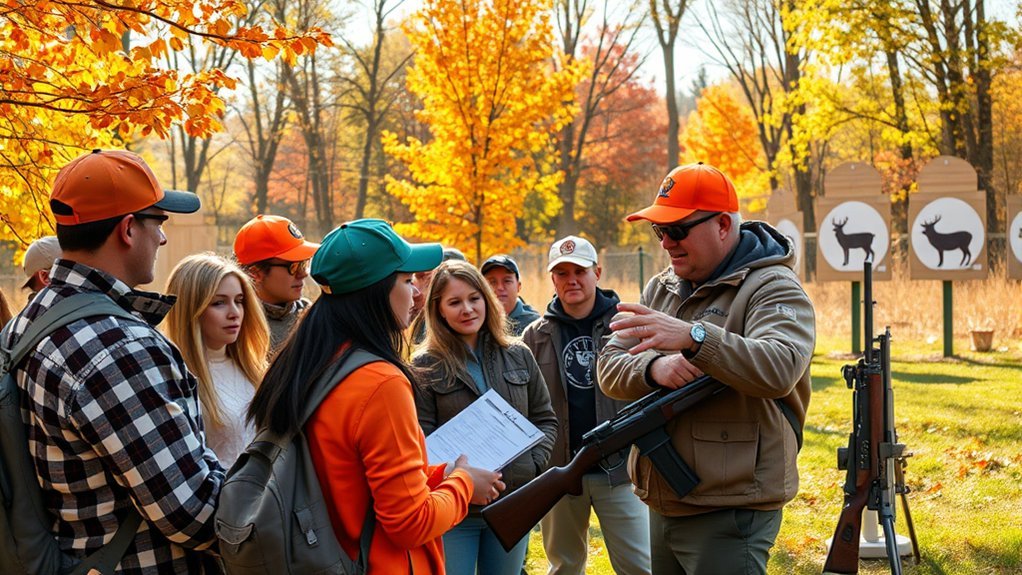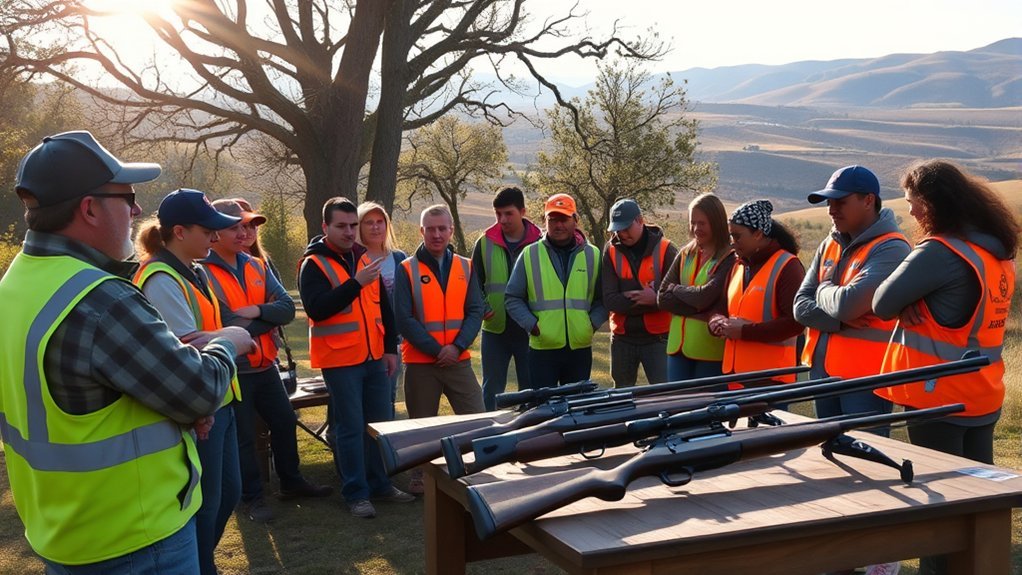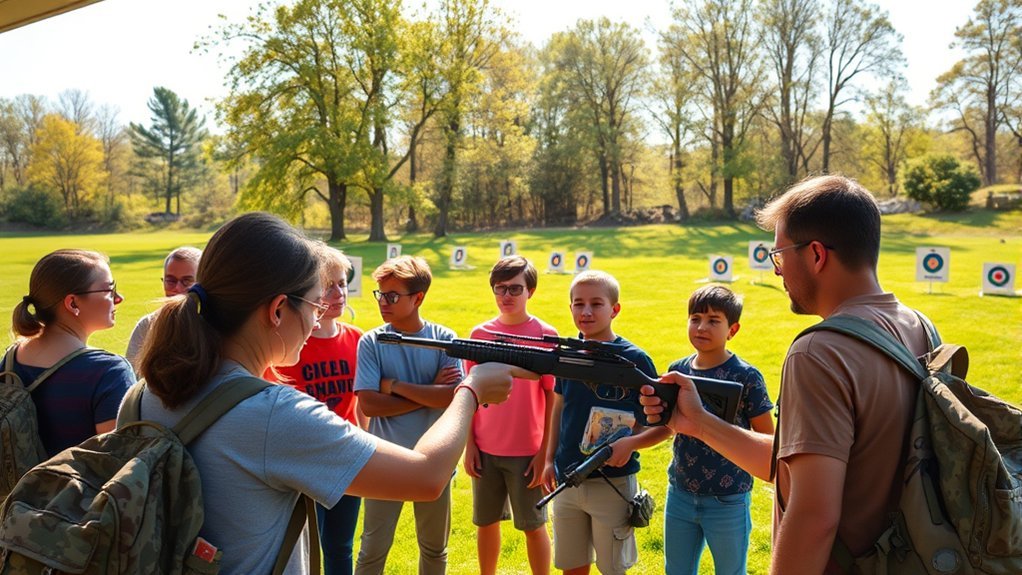It’s interesting how so many hunters underestimate the importance of education before heading out into the field. Hunter education courses provide essential knowledge that every aspiring hunter should grasp. From firearm safety to ethical practices, these courses cover it all. You might be surprised at how much you can learn and how it can impact your hunting experience. Let’s explore what these courses entail and why they’re vital for anyone looking to hunt responsibly.
Importance of Hunter Education

When you consider the thrill of hunting, it’s vital to remember that safety and responsibility should always come first. Hunter education equips you with the knowledge and skills needed to hunt safely. You’ll learn about firearm handling, wildlife conservation, and ethical hunting practices. This training not only protects you but also guarantees the safety of others in the field.
Additionally, understanding local laws and regulations is significant. Hunter education helps you navigate these rules, promoting responsible hunting behaviors. Completing a hunter education course often opens doors to obtaining hunting licenses and permits, making it easier for you to enjoy your outdoor experiences. Ultimately, investing in education enhances your skills, fosters respect for nature, and contributes to a safer hunting community.
Overview of Course Content

Hunter education courses cover a thorough range of topics that guarantee you’re well-prepared for the field. You’ll immerse yourself in the basics of hunting, including the types of game you might pursue and the habitats they inhabit. Understanding wildlife management is essential, as it helps you appreciate the balance of ecosystems. You’ll also learn about hunting laws and regulations, ensuring you stay compliant and respectful of nature. Additionally, courses often cover ethical hunting practices, emphasizing respect for animals and the environment. You’ll explore outdoor survival skills, so you’re ready for unexpected situations. By the end of your course, you’ll feel confident and equipped with the knowledge necessary to make responsible and informed decisions while hunting.
Firearm Safety Principles

Understanding firearm safety principles is vital for anyone who handles guns. You’ll learn basic handling rules, safe storage practices, and range etiquette guidelines that keep you and others safe. Let’s explore these essential practices to guarantee a responsible and enjoyable experience in the field.
Basic Firearm Handling Rules
Four essential firearm handling rules form the foundation of safe and responsible gun use. First, always treat every firearm as if it’s loaded. This mindset keeps you vigilant and reduces accidents. Second, keep your finger off the trigger until you’re ready to shoot; this helps prevent unintentional discharges. Third, never point a firearm at anything you don’t intend to shoot. This rule protects both you and those around you. Finally, be certain of your target and what’s beyond it; this guarantees you know what you’re shooting at and what could be hit. By adhering to these basic rules, you can greatly enhance safety during your hunting or shooting experiences, making them more enjoyable for everyone involved.
Safe Storage Practices
When it comes to safe storage practices for firearms, guaranteeing they’re securely stored is essential for preventing accidents and unauthorized access. Always keep your firearms unloaded when not in use. Invest in a quality gun safe or lockbox to store your firearms, guaranteeing it’s tamper-proof and inaccessible to children or untrained individuals. Utilize trigger locks or cable locks as an added layer of security. Store ammunition separately from firearms to reduce risk. Regularly check your storage methods to guarantee everything is secure and functioning properly. Educate family members about the importance of firearm safety and access restrictions. By adopting these safe storage practices, you’ll contribute to a safer environment for yourself and those around you.
Range Etiquette Guidelines
While visiting a shooting range, following proper etiquette is essential for ensuring everyone’s safety and enjoyment. First, always treat your firearm as if it’s loaded; never point it at anything you don’t intend to shoot. Keep your finger off the trigger until you’re ready to fire. When you arrive, familiarize yourself with the range rules and follow them closely. Make sure to wear appropriate eye and ear protection at all times. If someone is downrange, stay behind the firing line and wait for the clear signal before resuming shooting. Be respectful and keep noise to a minimum, allowing others to concentrate. Finally, clean up your area and dispose of all trash and spent casings properly before leaving.
Wildlife Conservation and Management
Understanding wildlife conservation and management is essential for preserving our natural ecosystems and ensuring sustainable hunting practices. By actively participating in these efforts, you can help maintain the balance between wildlife populations and their habitats. Here are a few key aspects to take into account:
- Habitat Protection: Supporting initiatives that protect and restore natural habitats is vital for wildlife survival.
- Population Monitoring: Engaging in data collection and reporting helps track species health and population dynamics, informing management decisions.
- Community Involvement: Collaborating with local wildlife organizations allows you to contribute to conservation efforts and educate others about the importance of preserving nature.
Ethical Hunting Practices
When you’re out in the field, understanding ethical hunting practices is essential for both your experience and wildlife conservation. By embracing fair chase principles, you respect the animals and their habitats while promoting sustainable hunting. This not only enhances your skills but also guarantees future generations can enjoy the same opportunities you do.
Fair Chase Principles
Ethical hunting practices, often encapsulated in the Fair Chase Principles, emphasize respect for wildlife and the environment, ensuring that hunters engage in their sport responsibly. These principles encourage you to honor the animals you pursue and the land you hunt on. By adhering to Fair Chase, you contribute to sustainable hunting practices.
Here are some key aspects of Fair Chase Principles:
- Respect for the animal: Always aim for a quick, humane kill to minimize suffering.
- Fair play: Avoid taking unfair advantage, such as using technology that hinders the animal’s ability to escape.
- Environmental stewardship: Protect habitats and maintain the natural balance while hunting.
Wildlife Conservation Importance
Wildlife conservation plays an essential role in maintaining healthy ecosystems, and as a hunter, you can be an important part of this effort. By practicing ethical hunting, you help guarantee that wildlife populations remain balanced and sustainable. This means respecting hunting regulations, understanding species populations, and hunting only what you need.
Participating in conservation initiatives, like habitat restoration or wildlife research, also enhances your impact. Educating yourself about local ecosystems enables you to make informed decisions that benefit both wildlife and your community. Remember, responsible hunters contribute to the preservation of nature, making it possible for future generations to enjoy these natural resources. Embrace your role in wildlife conservation, and you’ll not only improve your hunting experience but also protect the environment you cherish.
Hands-On Training Components
While theoretical knowledge is essential, hands-on training components in hunter education courses provide you with the practical skills necessary for safe and effective hunting. These experiences allow you to apply what you’ve learned in real-world situations, boosting your confidence and competence.
You can expect to engage in activities such as:
- Firearm Handling: Learn proper techniques for loading, unloading, and handling firearms safely.
- Shooting Practice: Gain experience at the range, mastering accuracy and control in various shooting positions.
- Field Scenarios: Participate in mock hunts to develop skills like tracking, game identification, and ethical decision-making.
Requirements and Regulations
Before hitting the field, it’s important to understand the requirements and regulations that govern hunting in your area. Each state has its own laws, so you should check for specific age restrictions, licensing requirements, and mandatory hunter education courses. Typically, you’ll need a valid hunting license, which often requires you to complete a hunter safety course. Additionally, familiarize yourself with hunting seasons, bag limits, and permitted hunting methods to guarantee compliance. You might also need to register your harvest, depending on local laws. Staying informed not only keeps you lawful but also promotes safety and ethical hunting practices. Don’t overlook these details—they’re essential for a successful and responsible hunting experience.
Benefits of Completing a Hunter Education Course
Completing a hunter education course offers numerous advantages that enhance your hunting experience and guarantee safety in the field. By participating in this course, you gain valuable knowledge and skills that can greatly improve your hunting proficiency. Here are some key benefits:
- Increased Safety: You’ll learn essential safety protocols, reducing the risk of accidents while hunting.
- Legal Compliance: Completing the course often fulfills state requirements, ensuring you’re legally allowed to hunt.
- Confidence Boost: Gaining a deeper understanding of hunting techniques and ethics helps you feel more confident on your hunts.
Conclusion
In summary, completing a hunter education course isn’t just a smart move; it’s a game-changer for your hunting experience! You’ll gain essential skills that make you a safer and more responsible hunter, while also contributing to wildlife conservation. Plus, with hands-on training, you’ll feel like a pro in no time. So, if you want to hunt like a legend, sign up for a course today and start your journey to becoming an informed and ethical hunter!

